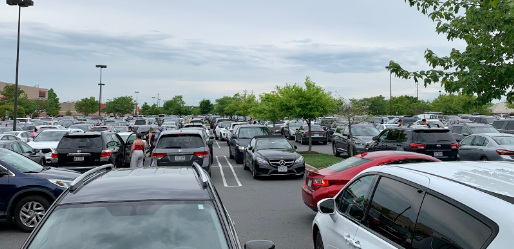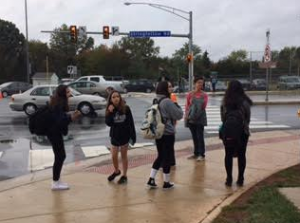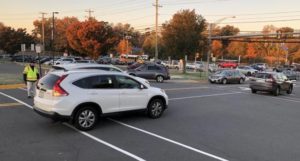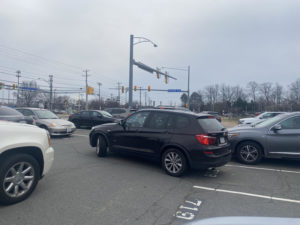Future generations need to shift gears from car culture

A vast parking lot in Chantilly bustles with cars, illustrating the extent to which cars have dominated transportation in our communities.
May 23, 2023
In every corner of the country, in every town, city and suburb, certain scenery remains constant: wide roads, drive-thrus and sprawling gray parking lots. Looking around, it is clear that the communities we call home are built to revolve around cars.
Meanwhile, in the media, cars are often shown as signs of success. Social media influencers flaunt fleets of shiny supercars and luxury SUVs; commercials sell cars as a means of independence and unlimited freedom. The constant glorification of cars has resulted in a culture where they are thought of as the default form of transportation. However, it is important to consider that there are many ways that being overly dependent on cars has harmed us, and cutting back on how much we use cars can greatly improve our lives.
It is well documented that cars have a negative impact on the environment. According to the Congressional Budget Office, 83% of carbon emissions from transportation are attributed to motor vehicles. Although electric vehicles are seen as a popular solution to emissions, like all cars, they still rely on factory manufacturing, using up resources and contributing to pollution. If we want to further minimize our impact on the environment, it is clear that we need to move away from cars as a whole, regardless of whether or not they run on green energy.
While we know the overuse of cars damages the health of Mother Earth, we also cannot forget the damage it does to our physical health. According to the University of Illinois Urbana-Champaign, cars are associated with a sedentary lifestyle, which creates a nearly direct link between the rate of car use and the rate of obesity in America. Walking, biking or even taking a short trip on foot to the nearest transit station all allow for some physical activity in our lives.
Our country’s heavy use of cars has also been detrimental to our mental health. According to Thriveworks, driving contributes to higher levels of stress in addition to creating a greater disconnect with the people around us. When we step out of our vehicles, we are able to see other human faces instead of hiding behind our personal metal boxes, letting us build stronger bonds within our communities.
Though many benefits can be found in ditching cars for other forms of transit, it is not easy in many parts of the country; American cities are built around car-based infrastructure, making walking and transit less flattering options. However, by lessening our car use now, we can push for a future where walking, biking and transit are more normalized in our car-centric country, putting more pressure on cities to be less focused on cars.
Teens in Northern Virginia have many privileges in regards to not using cars, such as living in an area where projects to build bike lanes and improve sidewalks are underway. FCPS students are also provided with free Fairfax Connector bus passes. America is still a long way from moving away from car dependency, but everyone has the power to take the first steps in the right direction.





